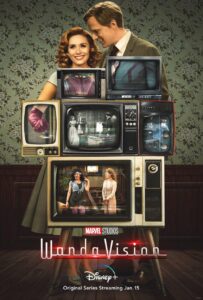Warning: We make no attempt to avoid spoilers for this discussion or in these notes! If you have not yet watched WandaVision, please turn aside now!
You have lost five years of your life. While you were away, the person you loved most in the world had died and you were unable to be there either for them or to grieve. Given the power to pretend that it all didn’t happen—that you have actually been blessed with your “happily ever after”—you might be tempted to, right? Now imagine that you have the power to actually make that a reality.
That’s the premise of Marvel’s latest series, WandaVision, streaming on Disney+. After returning from the “blip,” Wanda Maximoff finds that the “body” of Vision, the sentient android with whom she’d intended to spend the rest of her life, has been taken and disassembled by S.H.I.E.L.D.’s more aggressive counterpart, S.W.O.R.D. In a fit of pure grief, Wanda suffers a psychotic break and uses powers she barely understands to take an entire town hostage so that she and a not-quite-real Vision can live out idyllic lives based on sitcoms through the decades. Over the course of the series, she slowly heals and comes to understand the enormity of her actions. Before she is able to complete the process, though, she has other threats to address. The WandaVision series is directed by Matt Shakman with theme music composed by Christophe Beck and Alex Kovacs.
WandaVision takes us back to the Marvel Cinematic Universe in unexpected ways. While it has lots of action, smart writing, and plenty of fascinating content, it goes deeper and darker than we say in the majority of the first three phases of the MCU. We get some insight into both the folks who “blipped” and the folks who were left behind, and all the difficulties they have adjusting. We also observe the tragedies as Wanda comes to terms with her grief and the construct she created to deal with it falls apart around her. WandaVision offers many different layers and themes, and Eve and I try to scratch the surface in this (and the next) episode of Are You Just Watching.
Reaction Overviews
The production quality of WandaVision was beyond what we would normally have expected for a television series. Marvel leverages everything they have learned to make the quality of this series almost equal to that of the big-screen MCU. It might even be surpassing the early Phase I special effects. The writing and storytelling are just as evocative, dropping hints and leading the viewers on a carefully crafted chase to the very end. The early framing of the series as period-correct sitcoms added to the mystery of the show, even making us question what exactly it was we were watching. The story is carefully crafted to meld perfectly into the larger Marvel Cinematic Universe. WandaVision is eminently re-watchable—you can notice different details each time, and those will just serve to broaden the narrative of both the WandaVision story and the story of the greater MCU.

 One very interesting, if relatively cruel tease, was the casting of Evan Peters as Wanda’s brother, Piedro. Peters has actually played the character of Quicksilver several times before, but as part of Sony’s X-Men franchise, not as part of the MCU. The brother that Wanda lost in the battle of Sokovia was played by Aaron Taylor-Johnson. Of course, the Marvel team has already been hinting at the focus on the multiverse theory, leading many of us to think that Evan Peters’s introduction was a confirmation of that theory . . . until they yanked the rug out!
One very interesting, if relatively cruel tease, was the casting of Evan Peters as Wanda’s brother, Piedro. Peters has actually played the character of Quicksilver several times before, but as part of Sony’s X-Men franchise, not as part of the MCU. The brother that Wanda lost in the battle of Sokovia was played by Aaron Taylor-Johnson. Of course, the Marvel team has already been hinting at the focus on the multiverse theory, leading many of us to think that Evan Peters’s introduction was a confirmation of that theory . . . until they yanked the rug out!
In WandaVision, Elizabeth Olson really is allowed to shine as her own character, particularly after being pushed to the back row of heroes for the first three phases of the MCU. On Infinity War and Endgame, they really started to use Wanda more, but this series is where Marvel turns her into an anchor for Phase IV and beyond. Phases I, II, and III focused on Captain America, Iron Man, and Thor. It seems that one of those coveted positions moving forward will be filled by the newly crowned Scarlet Witch.
Even though WandaVision was not supposed to be the first series to hit Disney+, it feels like it should have been with as well as it picks up and carries us into the post blip MCU. The attention to detail was in everything from continuity, anachronisms, and even video formats, with only the quality of the high definition digital picture giving away that the black and white sitcoms were not authentic.
The Real Avengers Endgame Sequel
As the story of WandaVision develops, we learn that so much of the story is dependent on the tragedy that surrounds the blip and the return. Where Endgame worked hard to establish a sense of family among Tony Start, Pepper Pots, and their daughter, WandaVision has done the same with Wanda, Vision, and the boys. But where Tony and his family were to get the audience to invest in their happiness, WandaVision works hard to make the viewer feel uncomfortable; a certain feeling that “something is not right.” Once that feeling is established, they begin to provide the tragic backstory that fed into the events of the first several episodes, and how the blip and delayed return contribute to the motives of many of the actors.
The type of impact of Tony’s selfishness in trying to “have his cake and eat it too” is warned against in scripture:
“Do nothing out of selfish ambition or conceit, but in humility consider others as more important than yourselves. Everyone should look not to his own interests, but rather to the interests of others.” (Philippians 2:3-4)
The people outside of Wanda’s Hex are heavily affected by the blip as well. We get to witness Monica’s return and feel her pain at the loss of five years and missing her mother’s death from cancer. Both Jimmy and Darcy mention it—Darcy even gives Vision a “Spark Notes” version of events to bring him up to speed. We even see how it influenced Director Hayward and his motivations . . . and justifications.
The Politics of Marvel
The politics of Disney have been in the spotlight recently due to the surprise firing of Gina Carano from her recurring role on The Mandalorian. It was even more surprising since Disney had already announced a spin-off series for the character of Cara Dune, which they immediately had to scrap. From all appearances, the termination was politically motivated as Carano repeatedly expressed conservative views on social media.
In WandaVision, Director Hayward calls Wanda a terrorist. Monica disagrees but argues that Wanda didn’t have any premeditation. The problem is that they forget that the actual definition of terrorist requires the use or threats of violence in order to achieve political or monetary gain. Neither of the characters seems to remember this. But this oversight is the same oversight we see in today’s partisan politics. Fundamental Christians are called “hate groups” and “terrorists” despite the fact that they are neither.
While the final battle of WandaVision is between Wanda and Agatha, the more real feeling villain for me in the series of Director Harward. As a power-hungry, bitter soldier-turned-bureaucrat, his threat seems more real than the purple-spell-flinging, magic-stealing Agatha. He also represents a tendency in Hollywood to make the middle-aged white man the villain, particularly when the victims are culturally grouped. It may just be a reflection of our culture and the history of positions of power in it, but should we not try to change this perception the same way we should seek to challenge our perceptions of other character archetypes?
Coming Up . . . YOU!
This was just our introduction! We have so much yet to offer on this streaming series, but we want to give you all a chance to chime in on the second episode on WandaVision in which we’ll explore “The Moral of the Story.” Here are the headers only for the themes we’ll be discussing in part two. Based on only these headers, what can you contribute to our next episode?
- Thou Shall Not Covet!
- Life Has Rules!
- I’m Sorry for All the Pain I Caused
Head over to our Facebook group to share your thoughts!
Please support the podcast!

Are You Just Watching? is listener supported. Special thanks to our current patrons: Isaias Santillano, Craig Hardee, Stephen Brown II, David Lefton, and Peter Chapman for their generous support. We can't continue to share critical thinking for the entertained Christian without your financial help, so please head on over to our Patreon page and become one of our supporting patrons!
Share your feedback!
What did you think of WandaVision? We would like to know, even if just your reactions to the trailer or the topics we shared in this episode. Or what general critical-thinking and entertainment thoughts or questions do you have? Would you like to suggest a movie or TV show for us to give a Christian movie review with critical thinking?
- Comment on the shownotes
- Call (513) 818-2959 to leave a voicemail
- Email feedback@AreYouJustWatching.com (audio files welcome)
- Join our Facebook discussion group.


